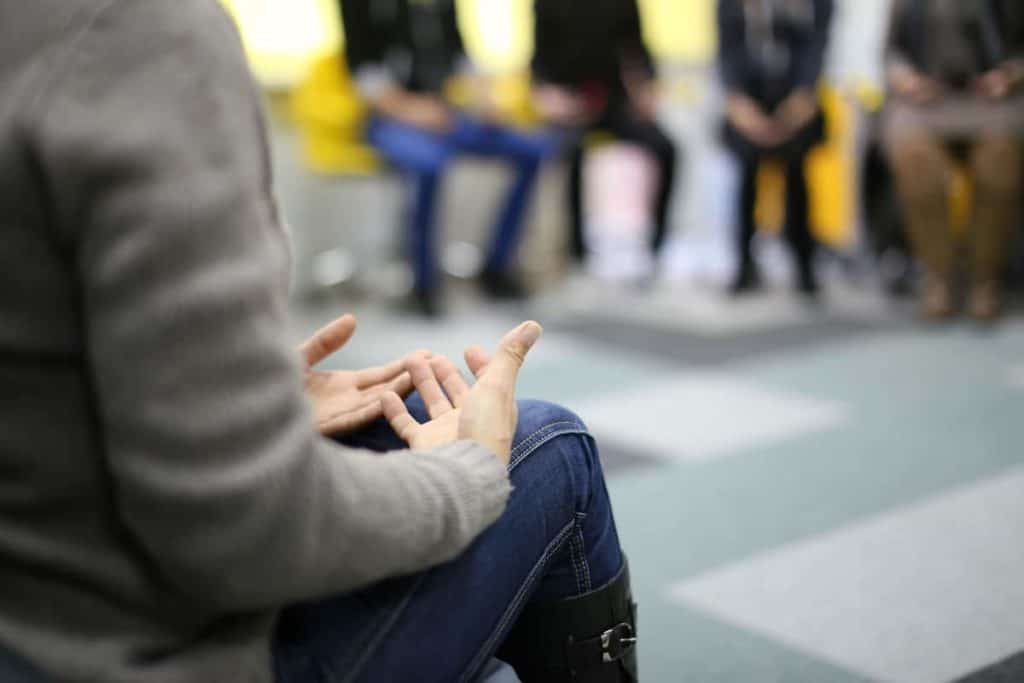What is an Intervention?
An intervention for addiction is an organized confrontation with a loved one about their drug or alcohol abuse. It can involve anyone (family, friends, coworkers) who has a relationship with the person struggling. They then use the opportunity to express how the person’s addiction has affected them. An intervention is not a form of addiction treatment but often a means of persuading a drug or alcohol addict to seek treatment from a rehab facility.
These are emotionally charged affairs that can be difficult for the addicted person and those who staged the intervention for addiction. Interventions are typically reserved as a last-ditch effort to motivate someone to seek treatment. They are not restricted to drug and alcohol addicts, and intentions can be used to confront a person about any debilitating behavior.
A substance use disorder is a medical illness characterized by clinically significant impairments in health, social function, and voluntary control over substance use.
“The good news is that a spectrum of effective strategies and services are available to identify, treat, and manage substance use problems and substance use disorders.”
Research shows that the most effective way to help someone with a substance use problem who may be at risk for developing a substance use disorder is to intervene early before the condition can progress. With this recognition, screening for substance misuse is increasingly being provided in general health care settings, so that emerging problems can be detected and early intervention provided if necessary. [1]


Get Your Life Back
Find Hope & Recovery. Get Safe Comfortable Detox, Addiction Rehab & Dual Diagnosis High-Quality Care.
Hotline(844) 597-1011How to Plan an Intervention for a Drug Addict
Anyone close to a long-term alcoholic or drug addict knows that getting someone to quit is tough. Denial is a powerful force that keeps a tight physical and mental grasp on its habitual users. Ready to approach them to get help? It would help if you had the right strategy–and the proper steps. The best way to go about such a sensitive topic is to work with a seasoned interventionist like one of ours at We Level Up addiction treatment center.
Do’s
- Be specific about times they have put themselves or others into harm, danger, or emotional turmoil
- Be concise and direct; decide for yourself that you will no longer be involved with the family member as long as he or she is acting out the addiction. This means leaving the relationship until they agree to enter into treatment
- Have a treatment plan in place
- Follow through on your word if they decline treatment
- Contact one of our professional interventionists and bring together all the people who are affected and hurt by the situation, love the individual, and are willing to stop contact with the addicted person until he or she goes into a treatment center or gets some other form of help
- Communicate openly with the professional to help stifle your need to control the situation, enable the afflicted, or be overly judgemental
- Accept the person as he or she is; understand that the addiction will continue, and learn to take care of yourself within the situation
Get Help. Get Better. Get Your Life Back.
Searching for Accredited Drug and Alcohol Rehab Centers Near You?
Even if you have failed previously and relapsed, or are in the middle of a difficult crisis, we stand ready to support you. Our trusted behavioral health specialists will not give up on you. When you feel ready or just want someone to speak to about therapy alternatives to change your life call us. Even if we cannot assist you, we will lead you to wherever you can get support. There is no obligation. Call our hotline today.
(844) 597-1011Steps Involved in an Intervention for Addiction
Only about 1 in 10 people with a substance use disorder receive any specialty treatment. [2] Most treatment has occurred in specialty substance use disorder treatment programs with little involvement by primary or general health care. However, a shift is occurring to mainstream the delivery of early intervention for addiction and treatment services into general health care practice.
Step 1: Get Help
The first step in orchestrating an intervention for addiction is contacting an intervention specialist. Your We Level Up addiction services counselor will walk you through the planning process to minimize the likelihood of unfavorable outcomes. Here is some guidance on how to do an intervention.
Do’s
- Guilt trips aren’t welcome here. The purpose is not to shame an addict but to open their eyes to how they have harmed themselves and others
- Do not yell. This can make them feel attacked and put them on the defensive
- Be mindful of the time and setting. Make this confrontation as non-stressful as possible and avoid doing it at a time when their emotions are already volatile (like after a breakup or getting fired) or somewhere that they’ll be distracted or intimidated.
- Be as specific as possible. It’s recommended that each participant has an itemized list of grievances that are short and to the point.
- Write down speaking points in advance. Doing so when you’re calm can help prevent things from being said harshly in the heat of the moment.

Step 2: Form the Intervention Team
Once you hire an interventionist, they will be able to advise you on the best practices for making the event go smoothly. Your interventionist may tell you the optimal times and places to hold the event based on your and the individual’s needs. In general, it is best to keep the drug/alcohol intervention early in the day or at a time when the addict is less likely to be drunk or high.
Holding the event at a neutral, familiar location is also advised. But remember, interventions are about the individual, so each situation differs, as does everyone. Some intervention groups might include children, grandparents, and other members of the family. However, children and the elderly must be prepared for extreme moments during the confrontation.
Step 3: Make a Plan
Next, an intervention specialist will familiarize participating family members or loved ones with substance abuse and addiction recovery. Knowledge and understanding can help provide insights the intervention party can use to persuade someone they need help. Finally, friends and family must rehearse and prepare for the intervention for addiction with their intervention specialist.
Friends and family can help initiate a “moment of clarity” by describing ways the addicted person has damaged them. These stories should be pre-written and examined by intervening members before the intervention. This includes preparing a specific day, time of day, location, and guest list. It also consists of an outline of how the method will work and what everyone will say. This is the comprehensive guide to the event.
Step 4: Gather Information
Learn about substance use disorder and the recovery process. Gather information about drug and alcohol detox and rehab programs, especially those that suit the personality and needs of the person struggling with addiction.
Step 5: Write Impact Statements
Everyone at the intervention for addiction should have something to say about the person’s struggles with addiction. Written statements about the impact on relationships can help the person struggling with drug or alcohol abuse to understand that their battle does not affect them alone. There is no place for personal attacks in these statements.
Step 6: Offer Help
People attending the intervention for addiction should be willing to support their loved ones in some capacity. In contrast, the person goes through drug or alcohol detox, inpatient rehab, and long-term recovery. For instance, offer rides to the center or suggest attending family therapy sessions or support group meetings with the person.
Step 7: Set Boundaries
Perhaps most importantly, your interventionist will direct you on how best to confront the addict without pushing them away or resenting you, which is one of the family’s worst fears. Keeping neutral ground can be hard when denial is strong or the alcoholic/addict becomes argumentative against others’ experiences. Still, our licensed interventionists provide unique strategies for these situations through their own experiences.

Step 8: Rehearse
Emotions run high concerning substance abuse and addiction. To avoid taking too much time, accusing the loved one, or falling into self-pity, rehearse the whole intervention for addiction with everyone at least once before it happens. Then, each team member will know what to say, when they will speak, and when to cede the floor.
Step 9: Manage Expectations
An intervention for addiction does not always assure admission to a treatment program. If your first conversation doesn’t seem to change anything, you can never know the impact it will have on their head. It might take 2 or 20 attempts before you make a breakthrough, and even once your loved one does enter a drug and alcohol treatment program, this does not guarantee long-term sobriety. Relapse is always a possibility. There may be times when your loved ones will want to give up themselves, and they may need you to keep trying for the both of you. Don’t give up. You and your love are powerful.
Step 10: Follow Up
You cannot control or predict how your loved one will react when confronted. Intervention specialists have professional experience calming hostile environments. Their presence is vital to keeping interventions as peaceful and effective as possible. Whether the person gets help or not, it is essential to support statements made during the intervention for addiction. Otherwise, the person may experience extreme stress, which could slow their rehabilitation process, lead to relapse, or exacerbate substance abuse problems.
First-class Facilities & Amenities
World-class High-Quality Addiction & Mental Health Rehabilitation Treatment
Rehab Centers TourRenowned Addiction Centers. Serene Private Facilities. Inpatient rehab programs vary.
Addiction Helpline(844) 597-1011Proven recovery success experience, backed by a Team w/ History of:
15+
Years of Unified Experience
100s
5-Star Reviews Across Our Centers
10K
Recovery Success Stories Across Our Network
- Low Patient to Therapist Ratio
- Onsite Medical Detox Center
- Comprehensive Dual-Diagnosis Treatment
- Complimentary Family & Alumni Programs
- Coaching, Recovery & Personal Development Events
Things to Avoid at an Intervention for Addiction
Don’ts
- Shame or berate
- Schedule the intervention for addiction at a time they are like to be stressed or intoxicated
- Ramble or vent — your healing will come when they are in a better place to listen
- Be negative
- Ignore the signs: The drugs that are available to generations these days are more dangerous than anything you ever experienced in your youth. The youth today might get hooked on painkillers such as Vicodin, Percocet, and Lortabs. Then when those highs don’t cut it, they get turned onto stronger opiates such as heroin, oxycontin, and potentially worse. Meth, cocaine, or crack might also fall into play. No one seems to walk completely away from this addiction because the temptation is there each and every day for the rest of their lives and they begin to fight a force they cannot win. See the signs and symptoms of their use and point them out; show them they aren’t fooling anyone with their behavior. [3]

World-class, Accredited, 5-Star Reviewed, Effective Addiction & Mental Health Programs. Complete Behavioral Health Inpatient Rehab, Detox plus Co-occuring Disorders Therapy.
CALL(844) 597-1011End the Addiction Pain. End the Emotional Rollercoaster. Get Your Life Back. Start Drug, Alcohol & Dual Diagnosis Mental Health Treatment Now. Get Free No-obligation Guidance by Substance Abuse Specialists Who Understand Addiction & Mental Health Recovery & Know How to Help.
Free Assessment: Call Us Now
If you think someone you love is struggling with addiction, you must try to get them help. And although it can be tough to come to terms with the fact that someone you love is struggling with addiction, it can save their life. You may even resort to denial and look the other way when you see the warning signs. There’s also a chance you have no idea how to get your loved ones the help they need, which is expected. One of the best ways to motivate your loved one to begin the road to recovery is through an intervention for an addiction like the one we’ve discussed here.
Searched for “How to intervention drug addiction?“ We Level Up intervention services offer premier treatment programs for you and for your family.
Experience Transformative Recovery at We Level Up Treatment Centers.
See our authentic success stories. Get inspired. Get the help you deserve.
Start a New Life
Begin with a free call to an addiction & behavioral health treatment advisor. Learn more about our dual-diagnosis programs. The We Level Up Treatment Center Network delivers recovery programs that vary by each treatment facility. Call to learn more.
- Personalized Care
- Caring Accountable Staff
- World-class Amenities
- Licensed & Accredited
- Renowned w/ 100s 5-Star Reviews
We’ll Call You
Sources:
[1-2] CHAPTER 4EARLY INTERVENTION, TREATMENT, AND MANAGEMENT OF SUBSTANCE USE DISORDERS – National Center for Biotechnology Information
[3] Drug & Alcohol Addiction Intervention Services – Level Up Lake Worth, FL


